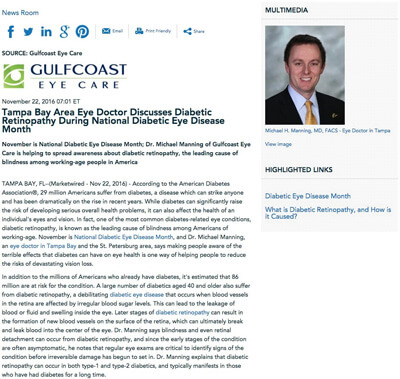Thanksgiving Closure: We will be closed on 11/28-11/29. Happy Thanksgiving from all of us at Gulf Coast Eye Care

News

November is National Diabetic Eye Disease Month. Dr. Michael Manning of Gulfcoast Eye Care is helping to spread awareness about diabetic retinopathy, the leading cause of blindness among working-age people in America.
Tampa Bay, FL – According to the American Diabetes Association®, 29 million Americans suffer from diabetes, a disease which can strike anyone and has been dramatically on the rise in recent years. While diabetes can significantly raise the risk of developing serious overall health problems, it can also affect the health of an individual’s eyes and vision. In fact, one of the most common diabetes-related eye conditions, diabetic retinopathy, is known as the leading cause of blindness among Americans of working-age. November is National Diabetic Eye Disease Month, and Dr. Michael Manning, an eye doctor in Tampa Bay and the St. Petersburg area, says making people aware of the terrible effects that diabetes can have on eye health is one way of helping people to reduce the risks of devastating vision loss.
In addition to the millions of Americans who already have diabetes, it’s estimated that 86 million are at risk for the condition. A large number of diabetics aged 40 and older also suffer from diabetic retinopathy, a debilitating diabetic eye disease that occurs when blood vessels in the retina are affected by irregular blood sugar levels. This can lead to the leakage of blood or fluid and swelling inside the eye. Later stages of diabetic retinopathy can result in the formation of new blood vessels on the surface of the retina, which can ultimately break and leak blood into the center of the eye. Dr. Manning says blindness and even retinal detachment can occur from diabetic retinopathy, and since the early stages of the condition are often asymptomatic, he notes that regular eye exams are critical to identify signs of the condition before irreversible damage has begun to set in. Dr. Manning explains that diabetic retinopathy can occur in both type-1 and type-2 diabetics, and typically manifests in those who have had diabetes for a long time.
Fortunately, Dr. Manning says, early diagnosis and treatment for diabetic retinopathy can slow the growth of new blood vessels on the eye and reduce the chances that the condition will lead to extensive vision loss. He notes that dilated eye exams performed at least once each year are imperative to find any irregularities as early as possible. He also recommends diligent monitoring and control of blood sugar levels, the avoidance of smoking, and regular exercise as important prevention steps for those who may be at risk for diabetic retinopathy. Dr. Manning says blurriness, “floaters” (small spots that move across fields of vision), and missing spots in one’s vision are some of the more common symptoms of diabetic retinopathy. However, even if one is experiencing no symptoms, Dr. Manning says it is vital to schedule regular eye exams. He notes that if there are any signs of diabetic retinopathy found during an exam, a customized treatment plan can be created to significantly slow its progression and give individuals a good chance of saving their eyesight.
About Michael H. Manning, MD, FACS
Certified by the American Board of Ophthalmology, Dr. Michael Manning is the director of Gulfcoast Eye Care, a comprehensive eye and vision care practice with locations in Palm Harbor, Pinellas Park, and St. Petersburg. Dr. Manning is a Fellow of the American College of Surgeons and a member of the American Academy of Ophthalmology, the American Society of Cataract and Refractive Surgery, the International Society of Refractive Surgery, and other organizations. Dr. Manning leads a team of ophthalmologists, specialist eye surgeons, and optometrists who are experienced in a range of procedures designed to improve vision and address common eye conditions. In addition to treatments for diabetic eye disease, options at the practice include cataract surgery, LASIK laser vision correction, and procedures to address glaucoma, dry eye syndrome, and other conditions. Dr. Manning is available for interview upon request.
The practice can be reached online at gulfcoasteyecare.com and facebook.com/gulfcoasteyecare.
Contact:
Gulfcoast Eye Care
Palm Harbor Office
2650 Tampa Rd.
Palm Harbor, FL 34684
Pinellas Park Office
6036 Park Blvd.
Pinellas Park, FL 33781
St. Petersburg Office
1515 9th Ave N.
St. Petersburg, FL 33705
(727) 485-9461